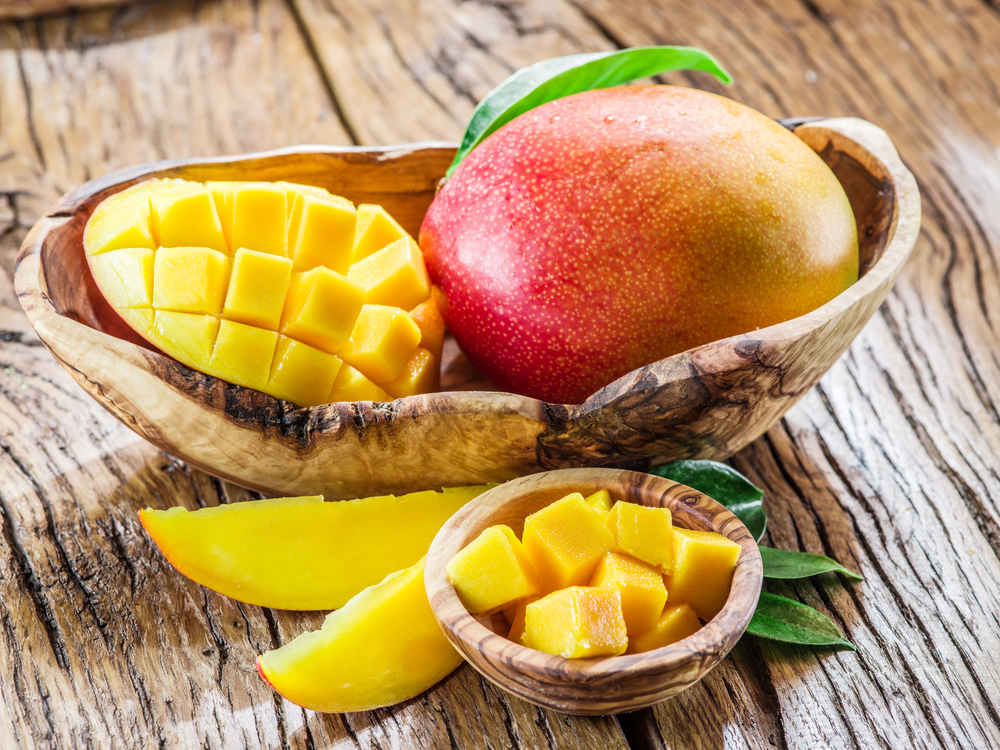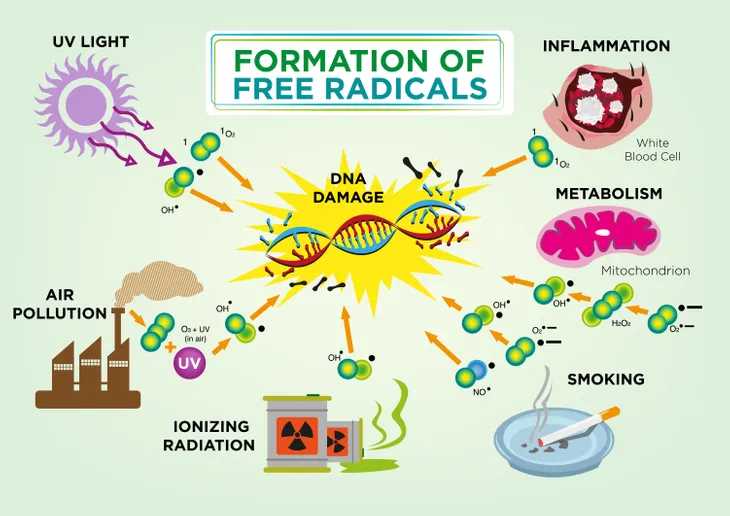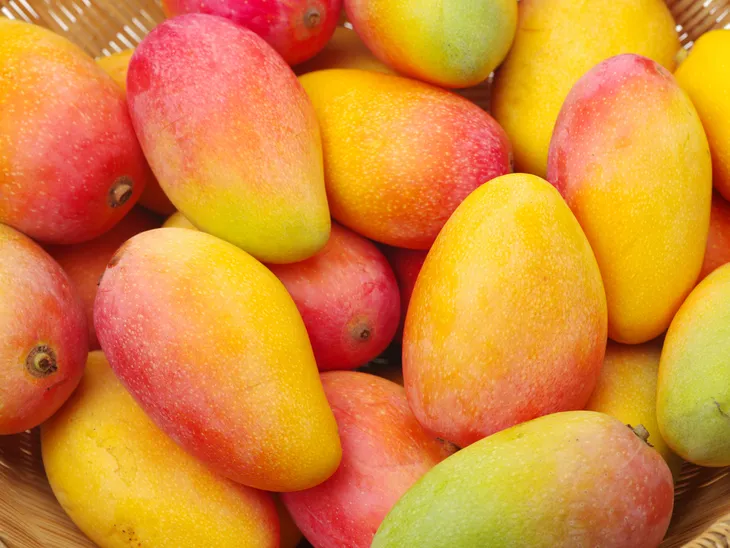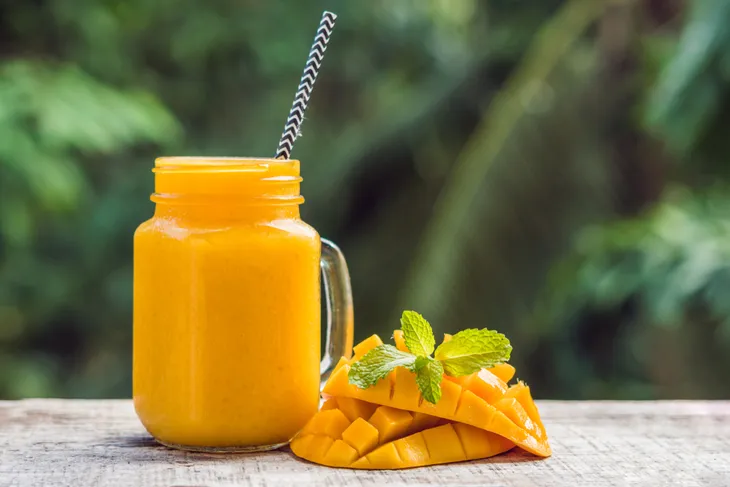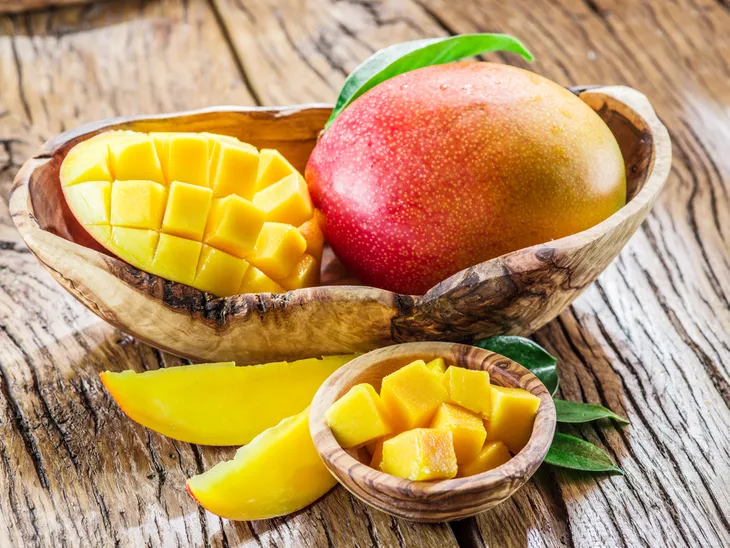Mangoes have been a popular fruit in India and Southeast Asia for thousands of years. Now, mangoes are a mainstream fruit that you can buy in almost any grocery store. These tasty, yellow drupes, another name for stone fruits, have a large seed in the middle and can weigh anywhere from a few ounces to a few pounds.
It’s not just the taste that makes mangoes a popular choice, mango health benefits are what makes this fruit a shining star with its high levels of vitamins, minerals, and antioxidants. Keep reading to learn more about mangoes and how adding them to your diet can benefit you!
Full of Antioxidants
Antioxidants are substances that can protect your cells from free radical damage. Free radical damage causes oxidative stress which can lead to cell and tissue damage. Luckily, mangoes are full of polyphenols which is a compound from plants that work as an antioxidant, says Healthline.
The source continues to say that mangoes have “…over a dozen different types [of polyphenols], including mangiferin, catechins, anthocyanins, quercetin, kaempferol, rhamnetin, benzoic acid, and many others.”
The polyphenol called mangiferin that is found in mangoes is particularly known for its antioxidant properties. It has shown promise in certain studies to combat cancer and heart disease. Want to keep certain conditions away and protect your body? Then eating this delicious fruit is one way you can achieve that!
Immunity-Boosting Vitamin A
When it’s cold outside and germs are seemingly everywhere you might want to consider adding mango into your diet to give your immune system a little boost. Mangoes are high in vitamin A, which helps fight infections.
According to Healthline, if you are vitamin A deficient then you have a higher risk of infections. A cup of mangoes contains 10-percent of your recommended dietary intake of vitamin A.
Immunity-Boosting Vitamin C
But if you are looking for a serious immune boost then it’s the vitamin C in mangoes you want to pay attention to. Vitamin C aids in white blood cell production, how your skin protects your body, and so much more. To really send it home, the U.S. National Library of Medicine tells us that “vitamin C deficiency results in impaired immunity and higher susceptibility to infections.”
But mangoes don’t only contain vitamin A and C. They also contain “folate, vitamin K, vitamin E, and several B vitamins, which aid immunity as well,” says Healthline. It’s clear that this fruit is a clear winner in keeping you healthy.
Heart Health
Heart health should be one of your priorities as it impacts so much of your body. Strokes, heart attacks, and coronary artery disease are all conditions that are influenced by the health of your heart.
According to the Centers for Disease Control and Prevention (CDC), “Heart disease is the leading cause of death for men, women, and people of most racial and ethnic groups in the United States.” It’s so common, that the CDC reports, one person passes away every 36-seconds from cardiovascular disease. With such staggering numbers, it’s crucial to find ways to support your heart and minimize your risks.
The heart and cardiovascular system may receive some support through the nutrients in mangoes. Mangoes are “a great source of magnesium and potassium, both of which are connected to lower blood pressure and a regular pulse,” reports WebMD. Remember how we talked about the polyphenol mangiferin in mangoes? Well, mangiferin might also reduce heart inflammation, continues the source.
Digestion
If you’ve ever had slow digestion that has led to constipation or bloating then you know how uncomfortable it can be. Before you grab an over-the-counter pill try to add more fruits and vegetables to your diet. Mangoes are especially valuable to your digestion and with their sweet taste, they’re pleasing to the palate too.
Mangoes contain two compounds that can help your digestion. The first is amylase which works to dissolve foods in your stomach so they can be absorbed and break down starches, says WebMD. Look for ripe mangoes as the amylase enzyme will be more active. The second compound is fiber. Dietary fiber keeps your bowel movements regular and alleviates constipation.
Eye Health
You may have no control over your need for glasses or contacts but there are other eye conditions that you might be able to avoid. Macular degeneration is a condition that worsens with age. It’s when you lose your vision in the center of your eye. While a lot of factors contribute to this condition there are antioxidants in mangoes called zeaxanthin and lutein that have been found to protect the eyes from it.
“Inside the retina, lutein and zeaxanthin act as a natural sunblock, absorbing excess light. In addition, they appear to protect your eyes from harmful blue light” reports Healthline. The vitamin A content found in mangoes can also prevent dry eyes and nighttime blindness says the source. Who would have thought that mangoes would have so many benefits to the eyes!
Skin and Hair
Vitamin A has been one of the all-star nutrients found in mangoes. Its beneficial properties extend all the way to the skin and hair. “This nutrient helps the skin provide an oily substance called sebum, which moisturizes the hair,” says Medical News Today. Vitamin A also protects your skin from the sun.
Vitamin C found in mangoes can also benefit your skin. This vitamin “supports the development and maintenance of collagen” which keeps your skin looking youthful and prevents wrinkles and skin sagging, states Healthline.
Cancer-Fighting Polyphenols
While we can never promise that mangoes will eliminate your chance of developing cancer, we can tell you how they do have some nutrients that can protect your body. Mangoes contain polyphenols, which according to Healthline have anticancer properties.
These polyphenols minimize free radical damage and oxidative stress which have “stopped the growth or destroyed various cancer cells, including leukemia and cancer of the colon, lung, prostate, and breast” continues the source.
Cancer-Fighting Beta-Carotene
It’s not only the polyphenols in mangoes that protect against cancer. Medical News Today reported that “the Skin Cancer Foundation suggests that a diet high in beta-carotene content can help protect against skin cancer.” It turns out mangoes also contain beta-carotene.
How to Eat It
Now that we’ve convinced you of all the amazing health benefits of mangoes, it’s time to learn how to eat this sweet fruit. After all, its oblong shape and large pit make it hard to cut. Luckily we have a trick that will help you cut mangoes with ease!
Stand the mango up with the larger base against your cutting board. Cut down the long side staying close to the middle and allow your knife to glide against the pit. Repeat this step on the other side of the pit and you should have two sections with yellow flesh. Don’t forget, you can also eat the flesh around the pit too!
Ways to Eat More Mangoes
Feel free to eat your mango fresh as a snack. It’s also a great addition to your smoothies, leafy salads, or make a colorful fruit salad.
If you have several ripe mangoes, go ahead and cut them all up into chunks. They freeze well and can be used at a later time.
Mango Nutrition
Mangoes are the perfect low-calorie food that is also full of key nutrients that help your body in so many different ways. Here is the nutrition profile of 1-cup of mango according to the U.S. Department of Agriculture (USDA):
- Calories: 99
- Protein: 1.35-grams
- Carbs: 24.8-grams
- Fat: 0.67-grams
- Dietary fiber: 2.64grams
- Vitamin C: 60-milligrams
- Vitamin A: 89-milligrams
With all this information, it’s clear that mangoes are a nutrient-dense fruit that can make an impact on your overall health. But remember too much of anything isn’t the best for you so stick to one serving a day. Once you have a bite we bet that you won’t need much more convincing to eat this sweet, juicy fruit!
